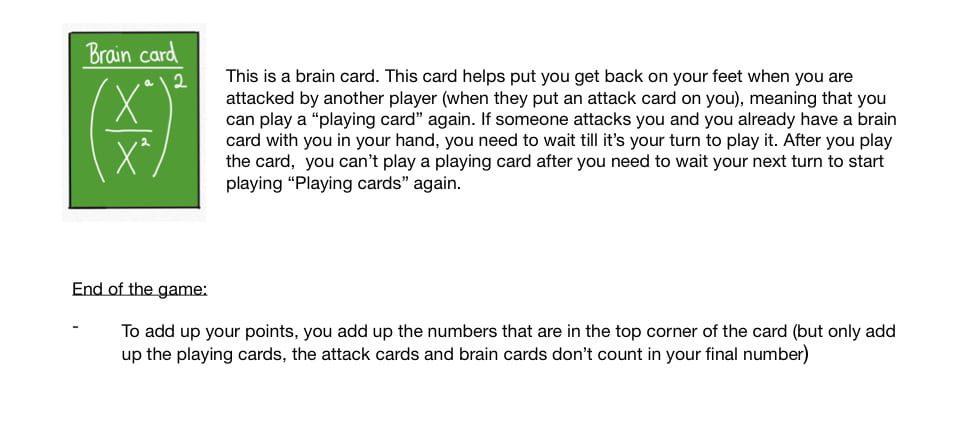Math exponents game blog post
So, we just finished a big math project, and this is my project on how it improved my understanding of the big idea and my proficiency in the curricular competencies. So the big idea of this project was “How does math make games more complex, interesting, and replayable?”. So yeah, basically we had to make a card game with math, specifically a certain type of math, exponent laws. That’s not what we started out doing though. Our first milestone was to make a dice game. Just a normal dice game, with no fancy math involved.
I didn’t really understand the point of this at first, but later I realized how it helped me understand the basics of pretty much any kind of game. Our next milestone was a math quiz, to test our knowledge on exponent laws. There wasn’t really anything special about this milestone, it was just a regular old math quiz. However, the next milestone was pretty important, as it was the first draft of our actual game. I had Alex as my partner, you can find her blog here. For our game, we ended up deciding on a card game where you draw and play playing cards on your turn to earn points, all while using exponent laws. The goal of the game is to get to 500 points. However, to spice things up a bit, we decided to add attack cards. If you get one of these cards you can use it on your opponent to stop the, from playing playing cards. However, if you draw and play a brain card, you can play playing cards as normal. The full rules are right here if you care to read them.
 Our next milestone was a second draft of our game. We had this feedback to base our second draft on:
Our next milestone was a second draft of our game. We had this feedback to base our second draft on:
For our next draft, we did exactly that. We specified our rules so that you just add up the numbers on the playing cards, as opposed to calculating he exponents themselves. We then had another group play test our game, only using the rules we wrote and not using is for reference. They got gist of the game fairly quickly, but were disorganized with where they put their cards, so we put a picture of what the layout was supposed to look like in the rules. Our final rules draft is right here:
 The final milestone was to have another class come in and play our game. This went pretty well, and lots of people from the other class had fun playing our game. So, overall, I think our game was a pretty good success, as it was pretty fun, and helped me learn exponent laws in the process. So now I can confidently answer the big idea, “How does math make games more complex, interesting, and replayable?“, in that math makes games more random, and gives more of a sense of chance to games. It can insure that every game you play will have a different outcome. It is also useful for points. And for the curricular competencies, it definitely helped, as I knew nothing about exponent laws before, and now I can confidently say I am proficient in using the exponent laws. And that’s about it for this blog post, thanks for reading!
The final milestone was to have another class come in and play our game. This went pretty well, and lots of people from the other class had fun playing our game. So, overall, I think our game was a pretty good success, as it was pretty fun, and helped me learn exponent laws in the process. So now I can confidently answer the big idea, “How does math make games more complex, interesting, and replayable?“, in that math makes games more random, and gives more of a sense of chance to games. It can insure that every game you play will have a different outcome. It is also useful for points. And for the curricular competencies, it definitely helped, as I knew nothing about exponent laws before, and now I can confidently say I am proficient in using the exponent laws. And that’s about it for this blog post, thanks for reading!